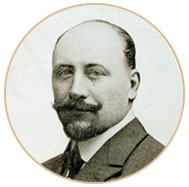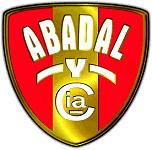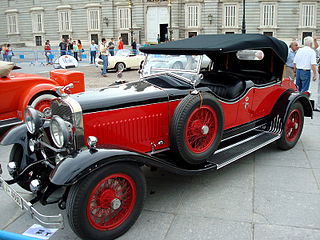
A sports car is a type of car that is designed with an emphasis on dynamic performance, such as handling, acceleration, top speed, the thrill of driving, and racing capability. Sports cars originated in Europe in the early 1910s and are currently produced by many manufacturers around the world.

Hispano-Suiza is a Spanish automotive company. It was founded in 1904 by Marc Birkigt and Damián Mateu as an automobile manufacturer and eventually had several factories in Spain and France that produced luxury cars, aircraft engines, trucks and weapons.

Marc Birkigt was a Swiss engineer, automotive and aviation pioneer, and co-founder of Hispano-Suiza in 1904.

Abadal is a Spanish automobile company founded by the famous early 20th century racing driver Don Francisco Serramelera Abadal, better known as Paco Abadal, in Barcelona in 1912.

The HS.404 is an autocannon originally designed by and produced by the Swiss arm of the Spanish/Swiss company Hispano-Suiza in the mid-1930s. Production was later moved to the French arm of Hispano-Suiza.

The Hispano-Suiza 8 is a water-cooled V8 SOHC aero engine introduced by Hispano-Suiza in 1914 that went on to become the most commonly used liquid-cooled engine in the aircraft of the Entente Powers during the First World War. The original Hispano-Suiza 8A was rated at 140 hp (100 kW) and the later, larger displacement Hispano-Suiza 8F reached 330 hp (250 kW).

The Hispano-Suiza H6 is a luxury car that was produced by Hispano-Suiza, mostly in France. Introduced at the 1919 Paris Motor Show, the H6 was produced until 1933. Roughly 2,350 H6, H6B, and H6C cars were produced in total.

ENASA was a Spanish motor vehicle manufacturing company that was incorporated in 1946 after having bought the automotive assets of the Spanish Hispano-Suiza and the Italian Fiat in Spain. It produced trucks, buses and military armored vehicles under the Pegaso and, for a short while, Sava brands. ENASA belonged to INI, a Spanish state-owned industrial holding company.
Erwin Leo Himmel is an Austrian automobile designer.
PZL.56 Kania (buzzard) was a Polish pre-war project of a fighter aircraft designed by Wsiewołod Jakimiuk of the Państwowe Zakłady Lotnicze. A single-seat low-wing monoplane was a development of PZL.50 Jastrząb fighter, modified to house a Hispano-Suiza 12Y French inline engine.

The Hispano-Suiza J12 is a luxury automobile that was made by Hispano-Suiza in France from 1931 to 1938. It was the largest and most expensive car ever built by Hispano-Suiza. It replaced the Hispano-Suiza H6. The J12 was only available as a chassis, buyers having to arrange with an outside coachbuilder to add a body.

In 2023, Spain produced 2.45 million cars which makes it the 8th largest automobile producer country in the world and the 2nd largest car manufacturer in Europe after Germany, a position it maintained in 2024.

Saoutchik was a French coachbuilding company founded in 1906 and based in Neuilly-sur-Seine near Paris. The company was one of the best-known coachbuilders in France in the 1920s and 1930s and, together with Figoni et Falaschi and Franay, is considered one of the most important representatives of the "Baroque" style in French coachwork in the 1930s and 1940s.

The Romano R.90 was a prototype single-seat French floatplane fighter of the 1930s. A single example of the R.90 was built, but the type did form the basis of the Romano R.83 and Romano R.92 fighters which were built in secret for the Spanish Republicans during the Spanish Civil War.

Tauro Sport Auto was a Spanish manufacturer of luxury sports cars based in Valladolid, founded in 2010, when a group of Spanish businessmen joined with a British manufacturer of racing cars to create the company.

The Blériot-SPAD S.91 was a light-weight fighter aircraft by the French aircraft manufacturer Blériot.

The Hispano-Suiza H6B Dubonnet Xenia is a one-off luxury car made by Spanish automobile manufacturer Hispano-Suiza for French pilot and racing car driver André Dubonnet in 1938. The car was built on the chassis of the Hispano-Suiza H6B, however it uses the larger, more powerful engine from the H6C and an entirely new body design drawn by Jean Édouard Andreau and built by coachbuilder Saoutchik.

The Hispano-Suiza T49 was a car manufactured by the Spanish company Hispano-Suiza between 1924 and 1944. It was the Spanish version of the French H6B model. It had a 6-cylinder engine of 8,000 cm3, 160 hp and a maximum speed of 177 km / h. It featured four-wheel drum brakes, brake booster, and a three-speed gearshift with reverse.

The Hispano-Suiza Carmen is an electric sports car produced by Hispano-Suiza.
















